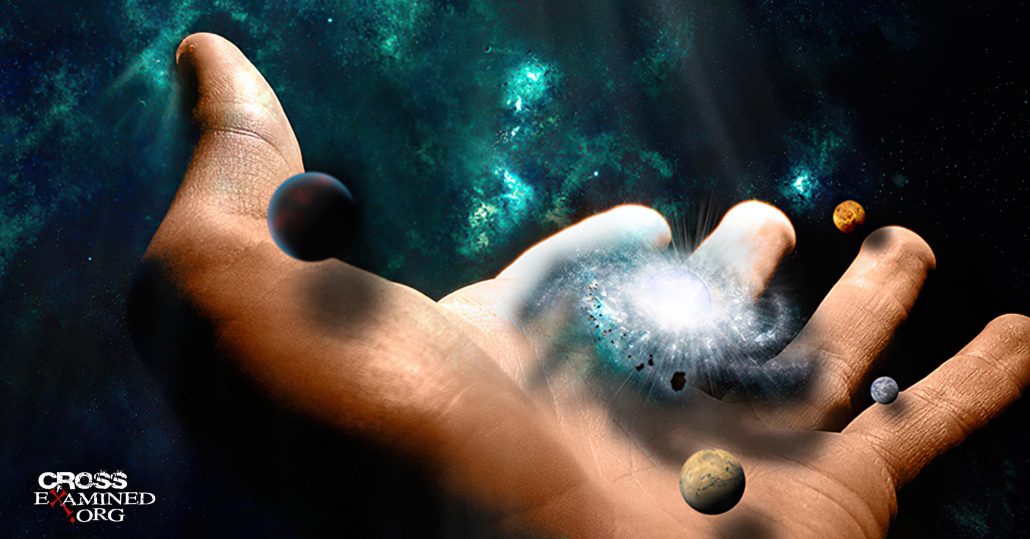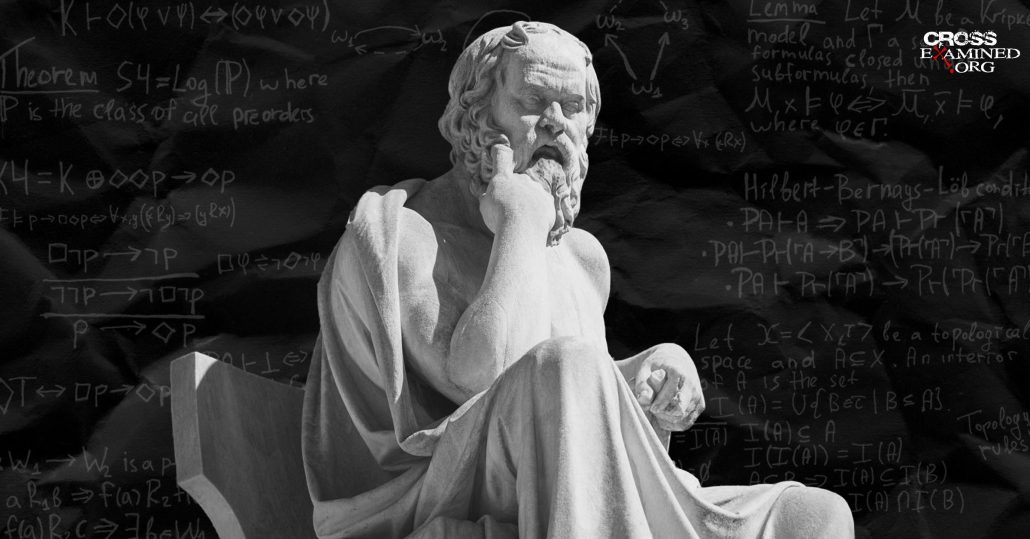By Richard Howe
In 2013, I had the privilege of participating in both a written and panel dialog/debate with K. Scott Oliphint of Westminster Seminary and Jason Lisle founder of the Biblical Science Institute. Oliphint is a theologian and Lisle is an astrophysicist. Both are proponents of the apologetic method of Presuppositionalism in the tradition of Cornelius Van Til.
Recently a student of mine asked me how I would respond to one of Jason Lisle’s challenges to me.
I contend that all knowledge begins in the senses and is completed in the intellect.
(Lest the reader misunderstand what I specifically mean by my use of the term ‘knowledge’ in this context, he is encouraged to read my blog article titled “Discussing Aquinas” here.) Lisle asked:
“How does he know that he’s not in the ‘Matrix’ and that his sensory experiences have nothing to do with the real world?”[1]
In helping the student by answering Lisle’s question directly, I also wanted to take the occasion to set Lisle’s question in a broader philosophical context to see how his question conceals certain philosophical assumptions that need to be surfaced and examined.
Lisle’s question is ultimately impossible. I claim that it is undeniable that one can know reality through the sensory faculties—seeing, hearing, tasting, touching, smelling. The reader should note the subtle shift here. Above, I said that all knowledge begins in the senses. Lisle’s challenge is in effect asking how any knowledge can arise from the senses. More to the point, Lisle is asking how I can know that my senses are reliable—how can I “know” that I “know.” Lisle’s challenge is less complicated to answer than my original contention is to defend. I will take the less complicated route here. It remains that the fact that any knowledge can arise from the senses is a necessary condition for the claim that all knowledge arises from the senses (and is completed in the intellect).[2]
The most common responses or challenges to my claim are this one that Lisle poses (how do you know your senses are reliable?) and questions to the effect of how can one acquire knowledge about non-physical truths like logic, morality, metaphysics, and God by means of the senses.
He makes the charge (in teeing up his challenge) that I have “tacitly presupposed (among other things) that our senses correspond to reality.”[3] As we shall see, I have done no such thing.
Lisle’s question implies that I could know that I know reality only if I know that my senses are reliable. Let’s momentarily grant his point for the sake of argument. I’ll come back to answer it directly. For now, consider what questions one would need to ask about Lisle’s challenge. Since my senses are themselves part of reality, how could I know that my senses are reliable when I claim that it is in them that my knowledge of reality has its origin? In other words, whatever means (be they other faculties besides the sensory faculties or something else) I use to deliver to me the conclusion that my senses are reliable, I would then have to ask how I know that this means was itself reliable. By whatever means #2 I might offer as to how I would answer that, how could I know means #2 is reliable when it tells me that the first means was reliable in telling me that my senses were reliable in telling me about reality? If I posit means #3 to tell me that means #2 is reliable when it tells me that the first means is reliable when it tells me that my senses are reliable in telling me what reality is, then ….
You get the picture. You have an infinite regress. Lisle thinks that he doesn’t have an infinite regress because he thinks he knows that God has told him about reality (or, more strictly, that God has told him that his senses are reliable). But how does Lisle know that God told him that? He thinks it’s because he has the Bible. He says, “Sensory experience is only reliable if our senses correspond to reality; and only the Christian worldview can rationally justify this.”[4] Lisle goes on, “Presuppositional apologetics is the method of defending the Christian faith that relies on the Bible as the supreme authority in all matters.”[5] But how can Lisle know that the book he’s referring to is a Bible and that the words he’s reading off the page are what he thinks they are? Isn’t Lisle using his eyes to read his Bible? But how can Lisle know that his eyes are telling him the truth of what’s written there, or, for that matter, whether there’s anything written at all? He can’t use the conclusions he gets from what his eyes are telling him he’s reading in the Bible to give him the certainty that he’s reading a Bible that tells him that he’s reading a message from God that is telling him that his eyes are reliable. It’s a vacuous, vicious circular argument.
Surprisingly, Lisle gladly acknowledges that his position is circular, though he will deny that it either vacuous or vicious. He seems to think he’s on to something when he says:
“It may surprise some people to learn that circular reasoning is actually logically valid.”[6]
But this is a trivial observation about validity. It would not surprise anyone with a basic understanding in formal logic. By definition, an argument is valid just in case it is impossible for the argument to have all true premises and a false conclusion.[7] This allows one to prove an argument is valid by showing how it would be impossible for a given argument to have a false conclusion where all the premises are true.
Consider this in light of what it is to be circular. A circular argument is one where the conclusion of the argument is the same as one of the premises in the argument. Being the same would mean that the conclusion and the premise would have the same truth value. If the conclusion is true, then the premise that makes the same claim as the conclusion would also be true. If the conclusion is false, then the premise that makes the same claim as the conclusion would also be false. Note, therefore, how this makes it impossible for a circular argument to be invalid. If the conclusion was false (to apply the test for invalidity by having a false conclusion with all true premises), then the premise to which it is identical would have to be false. Thus, it would be impossible for the argument to be rendered invalid since a false conclusion would necessitate one false premise (since they affirm the same thing and, thus, have the same truth value). Since such an argument cannot be rendered invalid, it is proven to be valid.
As it turns out, to point out that a circular argument is valid is to say nothing particularly significant about the argument.
Neither is it saying anything important about circularity. After all, any argument that has at least one premise that is a contradiction could not fulfill the conditions of invalidity either. This means that any argument that has a contradictory premise is valid.[8] Suppose someone accused Lisle of having a premise in his argument for Presuppositionalism that was a contradiction. How silly would it sound for Lisle to respond “It may surprise some people to learn that any argument where one of the premises is a contradiction is actually logically valid!” If Lisle is interested in putting forth a cogent deductive argument for his Presuppositionalism, what really matters is not merely whether the argument is valid, but whether the argument is sound—a valid argument with all true premises.
Having made his relatively unimportant comment about circularity and validity, Lisle then retorts that every epistemology is circular and proceeds to try to show why his circularity is not vacuous while the circularity of all other epistemologies is vacuous. He comments,
“The notion that circular reasoning is always wrong reveals a bit of philosophical naivety. In fact, all ultimate standards must be defended in a somewhat circular way (by a transcendental argument).”[9]
In this he is echoing what his presuppositional mentors have directed. Van Til says,
“To admit one’s own presuppositions and to point out the presuppositions of others is, therefore, to maintain that all reasoning is, in the nature of the case, circular reasoning. The starting point, the method, and the conclusion are always involved in one another.”[10]
Greg Bahnsen carries on Van Til’s position.
“So if, when it comes to the fundamental question of Christian faith, arguments are ultimately circular (since metaphysics and epistemology depend on one another), then the matter reduces to one of submission or rebellion to the authority of the revealed God. … Hence a Christian’s apologetical argument (working on a transcendental level) will finally be circular …”[11]
Scott Oliphint is right in line with the presuppositional orthodoxy.
“I admitted to him that I certainly was arguing in (some kind of) a circle. … Then I made clear to the other presenters that they were all asking that their own views, based on their own reasoning and sources, be accepted as true. In every case, I said, every other presenter appealed to his own final authority. ‘So, ‘ I asked, ‘on what basis should I accept your circle over mine?’”[12]
Are the Presuppositionalists right in maintaining that all reasoning is circular? No, they are not. Before I am done, I will explain why. For now, I should like to turn my focus back to the question at hand. In reading Presuppositionalists, I have discovered how often it is that they offer their Presuppositionalism as the only “solution” to philosophical problems that arise (for the most part) out of modern and contemporary philosophy (i.e., from the 17th century onward). By offering their Presuppositionalism as the “answer” to these problems, they show their tacit commitment to the assumptions of the very philosophy that created the problems in the first place. In Part Two of this article, I will, God willing, explore several of these philosophical problems.
Such a concession to the assumptions of modern and contemporary philosophy is never more evident than with Lisle’s challenge to me. He (perhaps unwittingly) has bought into the philosophical method of critical realism.[13] Critical realism is the approach to epistemology that tries to maintain the conclusions of philosophical realism (we will see in a moment what philosophical realism is) with the methods of critical philosophy (the otherwise legitimate expectation philosophers have of reasons or arguments demonstrating philosophical conclusions).
The term “realism” and its cognates have several different usages.
A person who sees himself as one who avoids romantic delusions about his circumstances or about the world might call himself a realist. In philosophy, the term is used in two very important yet distinct ways, only one of which concerns me here. One way has to do with whether one grants the reality of “universals” and, if so, how one regards the nature of a universal, especially in relation to “particulars.”[14] The other use has to do with whether one maintains that there is a physical world that exists external to us as knowers and that this world can be known by us as humans.
This kind of realist would deny that the world around us is somehow largely or entirely the ideas in our own minds (as opposed to physical objects external to our minds) and/or is the result of God’s imposing upon our minds the ideas out of which that world is constituted. These are variations upon the view called Idealism. Critical realism maintains that philosophy is obligated to “prove” or “justify” its claims that there is a world external to us as knowers. It insists that philosophical realists must somehow “prove” or “justify” philosophical realism; that is, that one must “prove” or “justify” the claim that one is not in the Matrix. Lisle’s challenge is quintessential critical realism.
Questions that have occupied philosophical realists through the millennia aim at exploring how it is that we know this external world.
Is it partly or entirely through the senses? Are there some aspects of the external world that can be accessed only through the mind with the faculty of intuition? Are there certain innate ideas that assist us in knowing some of the external world? Are there other options?
Notice what the philosophers are not asking or, at least, should not be asking if they are philosophical realists. They are not asking whether we know reality. Instead, they are asking how we know reality. My own view goes by different names, almost all of which employ the term ‘realism’.
It is a tradition arising from Aristotle (385-323 BC) and which finds its greatest expression in the philosophy of Thomas Aquinas (1225-1274). One will find a number of students of Aquinas scattered throughout the philosophical world. The number is perhaps small relative to those philosophers who reject Aquinas’s thinking. This is not to say, however, that all of those philosophers who reject Aquinas’s thinking would necessarily reject philosophical realism. The number is even smaller within Protestant Christianity and is very close to non-existence with evangelical Christianity.
My seminary, Southern Evangelical Seminary, is the only evangelical seminary in the world of which I am aware that deliberately embraces Thomistic philosophy.
The version of philosophical realism in this Aristotelian/Thomistic tradition has been called Moderate Realism,[15] Classical Realism, Scholastic Realism,[16] and Thomistic (or Thomist) Realism. Sometimes it goes by the simpler moniker of Thomism.
My direct answer to Lisle is to deny the coherency of his question. The Thomist—indeed, I would insist every “normal” person—already knows he’s not in the Matrix. The only reason the movie plot works is because the movie viewer is in the theatre and not in the movie itself. The very fact that we are in a world not of our own making that exists external to us as knowers is undeniably self-evident. To try to “prove” that self-evident reality, is to set up a process that inevitably makes the proof impossible. Historian of philosophy Etienne Gilson puts it deftly.
After passing twenty centuries of the very model of those self‑evident facts that only a madman would ever dream of doubting, the existence of the external world finally received its metaphysical demonstration from Descartes. Yet no sooner had he demonstrated the existence of the external world than his disciples realized that, not only was his proof worthless, but the very principles which made such a demonstration necessary at the same time rendered the attempted proof impossible.[17]
Lisle’s challenge is actually begging the question in favor of Idealism against Realism. As humans, we encounter the existing things of the external world by means of the senses. That world is reality (though, as Christians, we know that’s not all there is in reality). It is incoherent to demand that the knower somehow get back behind the sensible reality we know, and from there put together some “proof” or “argument” which arrives at the conclusion that there’s an external world out there that he knows. To put it more facetiously, if the world of sensible objects right in front of me is not enough for me to know that it’s there, then how can any argument about the sensible world be more compelling? The argument is itself one step removed from the world. And, as I argued above, from what “reality” could that argument arise that already doesn’t employ the very faculties to know it, for whose reliability Lisle demands a proof? It should be clear why Lisle’s Presuppositionalism is completely inadequate. If it is not clear, I shall, God willing, expand on my response as I explore in Part Two some of the other philosophical assumptions that Presuppositionalists make in laying out and defending their Presuppositionalism.
To complete my thoughts about circularity, Van Til et al. are certainly wrong in their contention that all reasoning is circular.
The mistake they make is assuming that reasoning starts with presuppositions (or assumptions, to use Bahnsen’s term). But human reasoning does not start with assumptions or presuppositions. These are all cognitive terms having to do with the activity of the intellect. But the intellect has to have some object to know. We don’t merely begin reasoning with reasoning itself. Instead, we begin reasoning with our encounter with the objective, sensible world. The things we encounter in the objective, sensible world are not propositions or assumptions or presuppositions. Rather, we encounter things—people, dogs, trees, etc. But the conclusion of an argument is a proposition.
A proposition is about reality. It is not, as a proposition, itself external reality.
Thus, the starting point of reasoning is not the same as the conclusion of the reasoning. It is manifest that for philosophical realists like Aristotle and Thomas Aquinas there is no circularity in their overall epistemology.
Presuppositionalists think that reasoning is circular largely because, when they think of epistemology, they think of it in the same terms that many modern and contemporary philosophers define the task of knowing. Modern (and, more so, contemporary) philosophers often couch knowing questions fundamentally along the contours of cognitive elements (propositions; assumptions; beliefs; logic) or consciousness elements (properties; qualia; thoughts, etc.). In contrast, the classical philosophy of Aristotle will define knowledge as beginning with the formal identity of the knower (via the intellect) and the known (without leaving out, when necessary and where appropriate, the cognitive and consciousness elements listed). Here, ‘formally’ means “employing the metaphysical aspect of the Form of sensible objects.” The specter of circularity comes up precisely because the elements according to which some philosophers cash out knowledge are themselves elements of the knowing process, without regard to factoring in the metaphysics of what it is to be a knower and what it is to be a known. As long as epistemology tries to “justify” itself only in terms of itself, it can hardly avoid being circular in some way. This the Thomistic model does not do.
While Lisle does not raise the following objection, I think it is important to deal with it nonetheless. It will do no good for someone to insist that we need a “proof” of the reliability of our senses since there are particular examples where our senses fail to tell us accurately what’s going on in the world.[18] Optical illusions can be known to be illusions only because we know the truth about a matter to which the illusion stands in contrast. If I think I see a pool of water ahead in the desert only to discover that it was a mirage, what were the means by which I discovered that it wasn’t really a pool of water after all? If everything is an illusion (or, as some have put it, if everything is a dream (Lisle’s Matrix challenge)) then the word ‘illusion’ doesn’t mean anything.
If one claims that everything he experiences is a dream, he has just exchanged the term ‘real’ for the term ‘dream’.
His dream is just what the rest of us call real. A dream is a dream only because it is in contrast to the real.[19] Without that contrast, one is committing what is known as the fallacy of lost contrast. Neither challenge—(1) challenging the reliability of the senses by offering a particular instance where the senses fail to tell us the truth about a situation or (2) globally challenging the reliability of the senses—offers any solace for the anti-realist or the Presuppositionalist.
While some of these types of challenges from the Presuppositionalist might have some force against modern and contemporary versions of empiricism, they are completely irrelevant to the classical empiricism of Aristotle and Aquinas. All the less are they demonstrations of the viability of Presuppositionalism.
References
[1] Jason Lisle, “Young Earth Presuppositionalism,” Christian Apologetics Journal 11, no. 2 (Fall 2013): 110, available at http://richardghowe.com/index_htm_files/CAJPresuppositionalism.pdf, accessed 06/08/20.
[2] In fairness to me, one should note that my specific claim to which Lisle was responding was: “As a Classical (or Scholastic) Realist I would submit that our sensory experiences of reality also deliver to us metaphysical truths.” [Richard G. Howe, “Classical Apologetics and Creationism,” Christian Apologetics Journal 11, no. 2 (Fall 2013): 93] This should allow me to confine my thoughts here to the weaker of the two claims. It remains for another occasion to address my contention about that we can know metaphysical truths from sensory experiences.
[3] Jason Lisle, “Presuppositional Reply,” Christian Apologetics Journal 11, no. 2 (Fall 2013): 110.
[4] Jason Lisle, “Presuppositional Reply,” 110.
[5] Jason Lisle, “Young Earth Presuppositionalism,” 65.
[6] Lisle, “Young Earth Presuppositionalism,” 80.
[7] Another way to say this is an argument is valid when the truth of the premises necessitates the truth of the conclusion. For a valid argument, if the premises are true, the conclusion has to be true.
[8] “Any argument at least one of whose premises is a contradiction is necessarily valid.” Robert Baum, Logic (New York: Holt, Rinehart, and Winston, 1975), 191.
[9] Lisle, “Young Earth Presuppositionalism,” 81.
[10] Cornelius Van Til, Apologetics (unpublished syllabus), “IV – The Problem of Method,” p. 62, emphasis in original.
[11] Greg Bahnsen, Presuppositional Apologetics: Stated and Defended (Power Springs: American Vision Presuppositionalists; Nacogdoches: Covenant Media Press, 2008), 86.
[12] K. Scott Oliphint, Covenantal Apologetics: Principles and Practice in Defense of Our Faith (Wheaton: Crossway, 2013), 24.
[13] For a treatment critical realism, see Etienne Gilson, Thomist Realism and the Critique of Knowledge, trans. by Mark A. Wauck, (San Francisco, Ignatius Press, 1986).
[14] An example of a universal is vividly displayed in the Nuremburg Trials. The justices in the trials were from the Soviet Union, France, the UK, and the US. The Nazi defendants could not be tried on the basis of the laws of these nations since they were not citizens of these nations. Neither could the Nazi defendants be tried on the basis of German law since none of their atrocities of the holocaust were in violation of German law. Instead, the Nazi defendants were indicted as having committed “crimes against humanity.” One would need to ask exactly what is a “humanity.” Is it male or female? Is it white, black, or some other race? Is it young or old? Is it rich or poor? Is it sick or well? One can see that “humanity” is none of the particular things. Instead, “humanity” is what philosophers call a universal. The question then is this: is the universal “humanity” real or not real in any meaningful sense of the term ‘real’? If you say that it is not real in any meaningful sense of the term ‘real’ (perhaps because you say it is nothing more than a concept in the mind), then how can one possibly commit a crime against it? If you say that it is real in some meaningful sense of the term ‘real’, then I submit that your understanding of the nature of the reality of that universal is likely going to be somewhere along the lines of the thinking of Plato or somewhere along the lines of the thinking of Aristotle—two of the most significant philosophers whose philosophy has help forge the contours of Western civilization. I am indebted to philosopher Joseph Koterski for this illustration from his lecture “Natural Law and Human Nature” in The Great Courses audio series.
[15] The ‘moderate’ of moderate realism comes from the fact that Aristotle’s view of universals falls between the extreme realism of Plato and the anti-realism of later philosophy.
[16] I am indebted to philosopher Edward Feser for this expression. It seeks to distinguish Thomas Aquinas’s view of universals from that of Aristotle’s regarding how universals are understood vis-à-vis the God of Christianity and the Christian doctrine of creation.
[17] Etienne Gilson, Thomist Realism, p. 27. For a scaled-down version of Gilson’s point in this work, see his Methodical Realism, trans. Philip Trower (Front Royal: Christendom Press, 1990). Reprinted Methodical Realism: A Primer for Beginning Realists (San Francisco: Ignatius Press, 2011).
[18] For a treatment of how epistemologies throughout history have sought to account for error in light of their accounts of knowledge, see Leo W. Keeler, The Problem of Error from Plato to Kant: A Historical and Critical Study. (Rome: Apud Aedes Pontificiae Universitatis Gregorianae, 1934). For a treatment of the issue within the context of Thomistic Realism, see Francis H. Parker, “On the Being of Falsity,” in Philosophy of Knowledge: Selected Readings. (Chicago: J. B. Lippincott, 1960): 290-316.
[19] I don’t mean here that there no sense in which a dream, as a dream, is real. My dream is real in a way that the dream of a fictional character in a novel is not. Rather, I’m saying that a dream about, for example, sunning on the beach is not the same as actually sunning on the beach.
Recommended resources related to the topic:
Stealing From God by Dr. Frank Turek (Book, 10-Part DVD Set, STUDENT Study Guide, TEACHER Study Guide)
I Don’t Have Enough Faith to Be an Atheist (Paperback), and (Sermon) by Norman Geisler and Frank Turek
Richard G. Howe is a Professor Emeritus of Philosophy and Apologetics (B.A., M.A., Ph.D.) Dissertation: A Defense of Thomas Aquinas’ Second Way. He is Professor Emeritus of Philosophy and Apologetics at Southern Evangelical Seminary in Charlotte, North Carolina. He has a BA in Bible from Mississippi College, an MA in Philosophy from the University of Mississippi, and a Ph.D. in Philosophy from the University of Arkansas. Dr. Howe is the past President of the International Society of Christian Apologetics (ISCA). He is a writer as well as a public speaker and debater in churches, conferences, and university campuses on issues concerning Christian apologetics and philosophy. He has spoken and/or debated in churches and universities in the US and Canada as well as Europe and Africa on issues relating to the defense of the Christian faith.
Original Blog Source: https://cutt.ly/vgxcMuk










